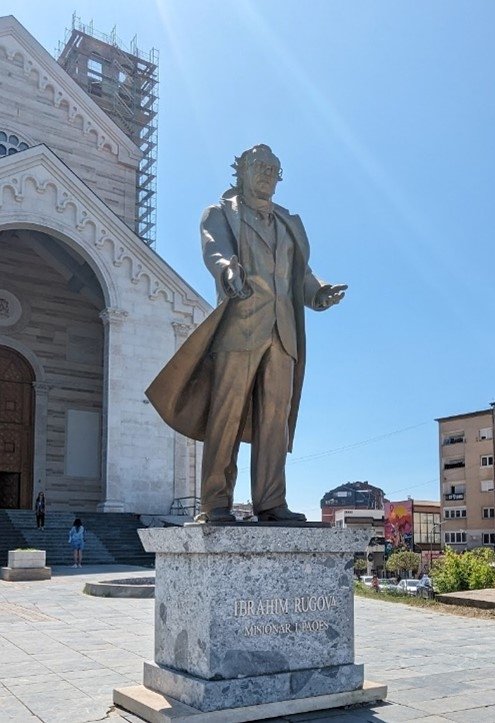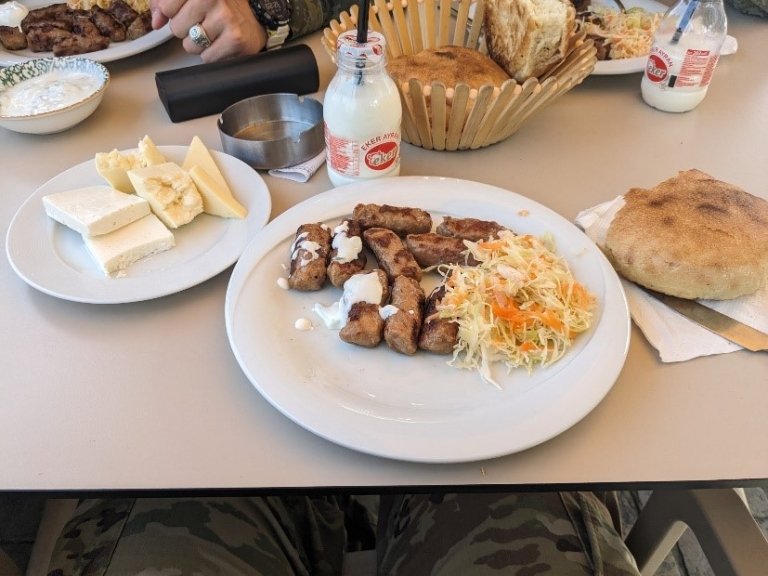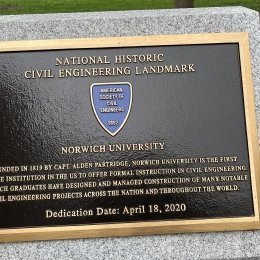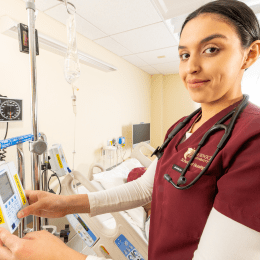Trip Abroad to Kosovo for International Cadets Week
Norwich student, Ana Lemler, shares her unique trip to Kosovo as part of their International Cadets Week to represent Norwich. Students had the opportunity to learn about the rich history, culture, and food, as well as its military and political past. Ana shares how the trip opened her eyes to a new global perspective.
In April, I was given the opportunity to travel to Kosovo as a part of their International Cadets Week and represent Norwich. It took a few weeks of planning and some arrangements before the day finally came for me and Cadet Whitlock to leave, but man, was it an experience!

I had never left the country before this trip, so I didn’t know how international travel worked or what to expect. Prof. Morris from the Peace and War Center sponsored the trip and gave me some insight into how to prepare, but continuously encouraged me to maintain an open mind and a learning mentality. I was nervous because I would be leaving for a week and returning a few days before final exams started. I gathered all of the school assignments and materials I had to complete in advance and anxiously waited for the day we would leave.
During our international flights, we had a layover in Istanbul and witnessed thousands of people on their pilgrimage to Mecca, since Ramadan would be ending soon. Another striking element about the airport was its size and array of shops. Because Istanbul is the airport for flights from the Middle East, Africa, and Western Europe, it has shops from every culture and sells more luxury goods than American airports. It was almost a mall with the addition of flights.
Kosovo became a country in 2008, so most of the country was still rebuilding from past and current friction with the Serbs. It was incredible to witness the dynamic of a new country within a region of thousands of years of history.
Landing in Pristina, Kosovo’s capital, I was eager to meet Lieutenant Elise and Captain Geci who were picking us up. We rode with them and a few cadets to the military base where we would be staying. Their officer training academy was on the military base and had a training system based on the Citadel. It prepared applicants to lead platoons in the Kosovo Security Force (KSF), and every officer in the country had gone through it. Everyone spoke English and it was easy to get along with those we were introduced to. Their hospitality was unlike any I had ever known.
We settled into our rooms a floor above where our cadet counterparts were staying until we met in the common area for tea, “Çaj,” served in the Turkish style. There were six countries represented: Albania, Canada, the US, North Macedonia, Kosovo, and Türkiye. Most of those in Kosovo were Albanian. The Serbs fled or migrated after the conflict of 1999, and the ongoing conflict that continued to put pressure on the Balkan region. Kosovo became a country in 2008, so most of the country was still rebuilding from past and current friction with the Serbs. It was incredible to witness the dynamic of a new country within a region of thousands of years of history.
We climbed to the top of a cathedral under construction only a few hundred meters from a mosque. It gave me another perspective on how America dealt with the Middle East and proved that while we fought in Desert Storm, the enemy practiced an extreme version of Islam.
We visited places in the capital where we toured different areas such as Bill Clinton Square, built in appreciation of America’s and NATO’s intervention in the war, the capital buildings where the democratic leaders met to make decisions. Whenever we had time, we would eat and try their food. There is a unique dynamic in the city because of their belief in freedom of religion. Islam is the predominant religion followed by Christianity. We climbed to the top of a cathedral under construction only a few hundred meters from a mosque. It gave me another perspective on how America dealt with the Middle East and proved that while we fought in Desert Storm, the enemy practiced an extreme version of Islam.

When we weren’t touring Pristina or Prizren, the old Albanian capital, we were eating. Their diet consists of a variety of cheeses, meats, and mainly bread. Everything was made fresh and tasted incredible because it didn’t have the preservatives or the added ingredients that you would find in America. Many of the dishes were influenced by Albanian, Turkish, or Greek cultures. The fruits were sweeter because they were so fresh. The bread was still warm because it had been baked minutes before. One of my favorite meals we tried was Qebapa, a form of links, cabbage, bread, and various cheeses. It was made by a restaurant that had existed for decades, even surviving the bombings from the war. Talk about resiliency!
Kosovo is such a small country that everyone there feels like family. When we were resting at a sweets café in Pristina, we met the previous president of Kosovo and some of the leaders he was meeting with. This closeness and trust within the people were something I had never experienced before. This bond also affected how the citizens viewed the military. If we were in uniform, almost everyone we passed would greet us, thank us, or ask to shake our hands. Even within the KSF, cadets were required to greet all non-commissioned officers (NCOs) and officers out of respect. Many of them had fought in the war and that past was still a fresh wound to the Kosovars.
While half the time was spent touring and exchanging cultures, the rest was spent training on military bases or hiking. We traveled to a base with the 5th largest search and rescue training facilities in the world with a 20-meter rock tower we were allowed to rappel from, a hostage situation simulation in broken buildings, an earthquake simulation with walls and cars thrown out of place, and a water rescue simulation in a pool with a house at the center. We spent a day on base and another day climbing to the highest peak in Kosovo at 2,568 meters. We were only a kilometer or two from the borders with Albania and North Macedonia. I had never climbed something so tall before and it was an unforgettable view atop the mountain plateau.
We were a diverse group, but we got along so well in the four days we were there that I am confident I will return to visit the family I made in that academy. Leaving was the hardest part of the trip because it meant returning to what I had known and that the adventure had come to an end. I said my goodbyes and left through security. Fitore, Gabriella, Albion, Klinton, and all my other brothers and sisters; I am so grateful to have met you and look forward to the day when I can see you again. Thank you for the memories we made and for entertaining us while we visited. Our precious time may be over now, but I’ll be sure to make more with you all. For those reading from Norwich, be sure to take that step into the unknown. You never know what may be lying beyond the veil of fear. Essayons.
Read More

A New Era for Norwich Cavalry
Norwich’s Cavalry Troop blends historic tradition with hands-on horsemanship and leadership, where cadets learn to ride, care for horses, and grow as citizen-leaders at Cedar Ridge Farm under expert trainer Kim Bisson.

Engineering a Nation: Norwich University and the Birth of Civil Engineering
Norwich University, founded in 1819 by Captain Alden Partridge, has been recognized by the American Society of Civil Engineers as a National Historic Civil Engineering Landmark for its role as the first private U.S. college to offer formal civil engineering instruction and its lasting impact on the profession worldwide.

What is a Major in College? 5 Tips to Choosing Your Best Major
Choosing your academic major in college is a big decision that can chart the course for the rest of your life. Luckily, you don't have to make this decision on your own. We've created a simple breakdown of college majors, answer the question: "What is a major in college?", and provide other important questions to ask yourself. Keep reading to learn more!
